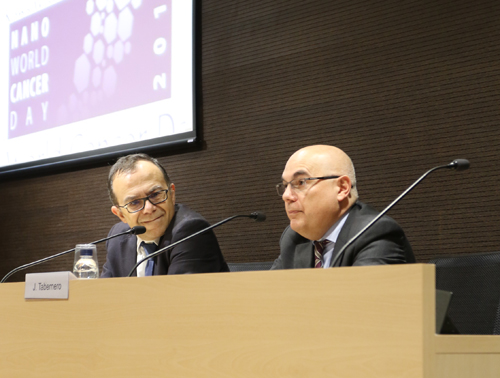IBEC Seminar: Stijn Mertens
Electrochemical surface science of TiO2 rutile (110), graphene and boron nitride
Electrochemical surface science of TiO2 rutile (110), graphene and boron nitride
Electrochemical surface science of TiO2 rutile (110), graphene and boron nitride
Electrochemical surface science of TiO2 rutile (110), graphene and boron nitride Stijn Mertens, TU Wien, Institute of Applied Physics / KU Leuven, Chemistry Department The rational design of catalysts and … Read more
Electrochemical surface science of TiO2 rutile (110), graphene and boron nitride Stijn Mertens, TU Wien, Institute of Applied Physics / KU Leuven, Chemistry Department The rational design of catalysts and … Read more
 Today the IBEC-managed Spanish Nanotechnology Platform, NanoMed Spain, co-hosted the fourth edition of Nano World Cancer Day 2017, a global initiative organized as part of World Cancer Day.
Today the IBEC-managed Spanish Nanotechnology Platform, NanoMed Spain, co-hosted the fourth edition of Nano World Cancer Day 2017, a global initiative organized as part of World Cancer Day.It’s the second year running that the platform has hosted the conference, which took place at Vall d’Hebron Instituto de Oncología (VHIO) and was opened by Josep Tabernero, Director of VHIO, and IBEC/NanoMed Spain’s Josep Samitier, who also gave a talk.
PhD Discussion sessions are open to all staff and researchers at all career stages, and are intended to help PhD students gain feedback from colleagues by presenting their research results and discussing them with each other, as well as with more experienced researchers.
PhD Discussion sessions are open to all staff and researchers at all career stages, and are intended to help PhD students gain feedback from colleagues by presenting their research results and discussing them with each other, as well as with more experienced researchers.
PhD Discussion sessions are open to all staff and researchers at all career stages, and are intended to help PhD students gain feedback from colleagues by presenting their research results and discussing them with each other, as well as with more experienced researchers.
PhD Discussion sessions are open to all staff and researchers at all career stages, and are intended to help PhD students gain feedback from colleagues by presenting their research results and discussing them with each other, as well as with more experienced researchers.
Complementary Skills Sessions are open to all staff and researchers at all career stages.